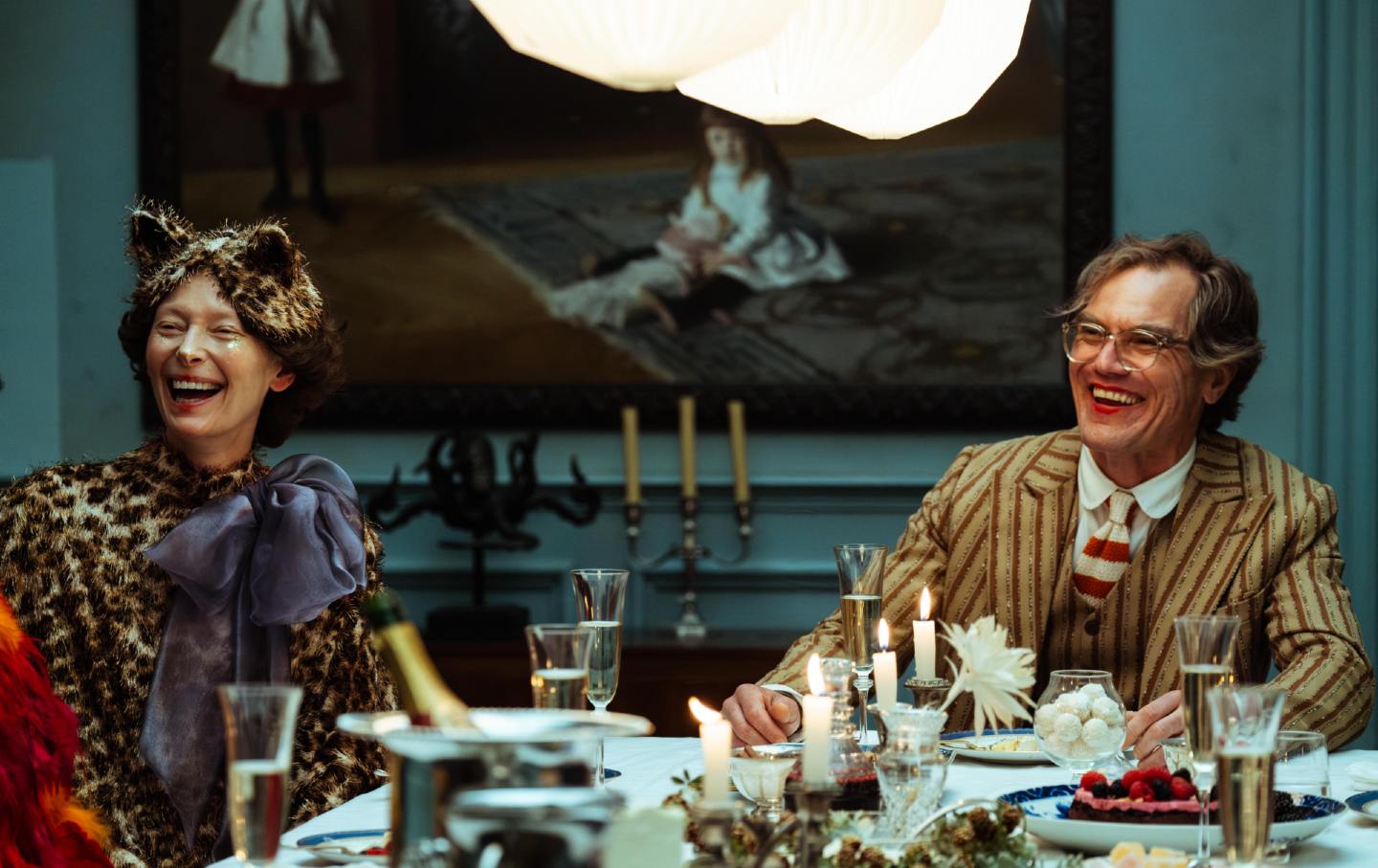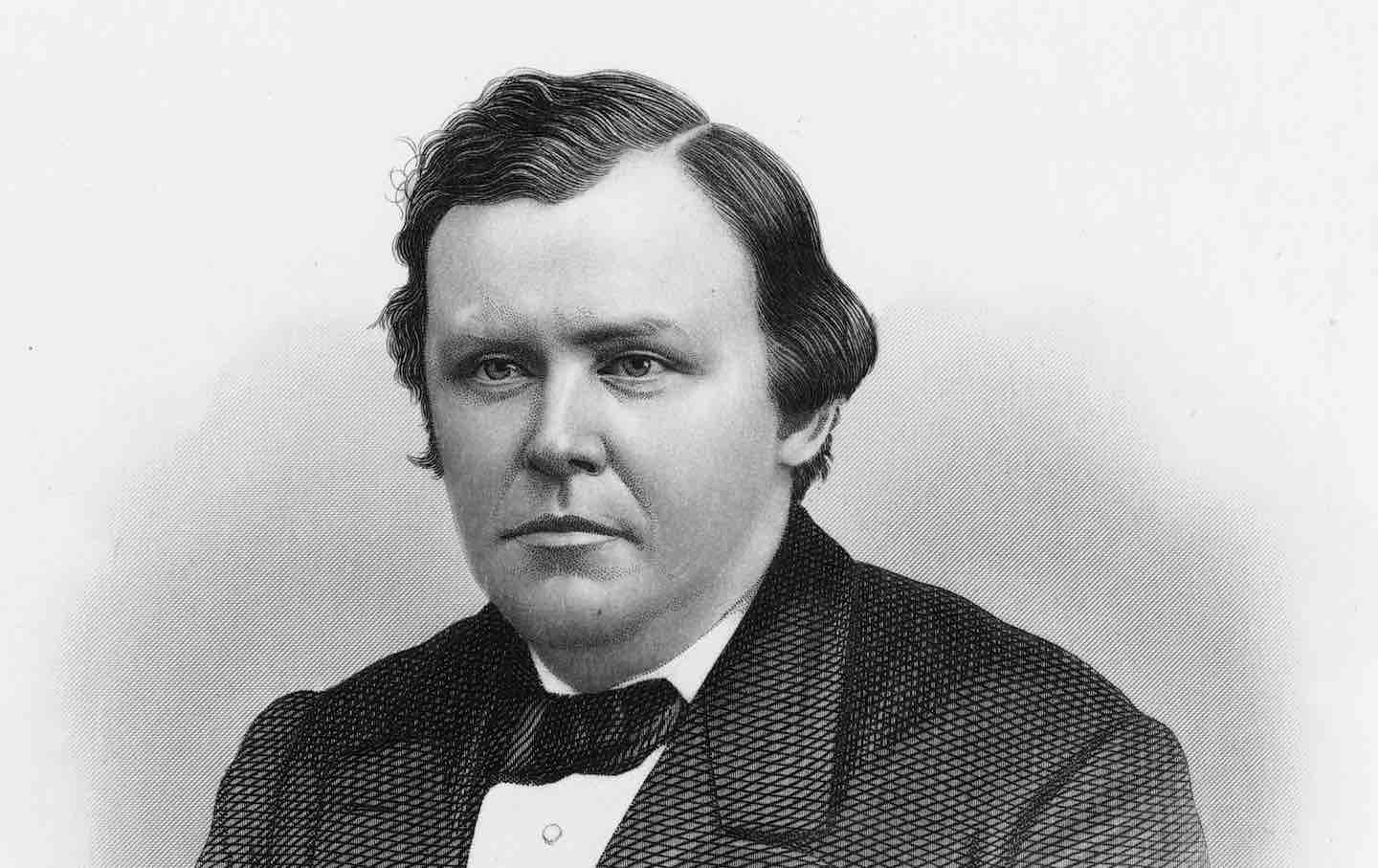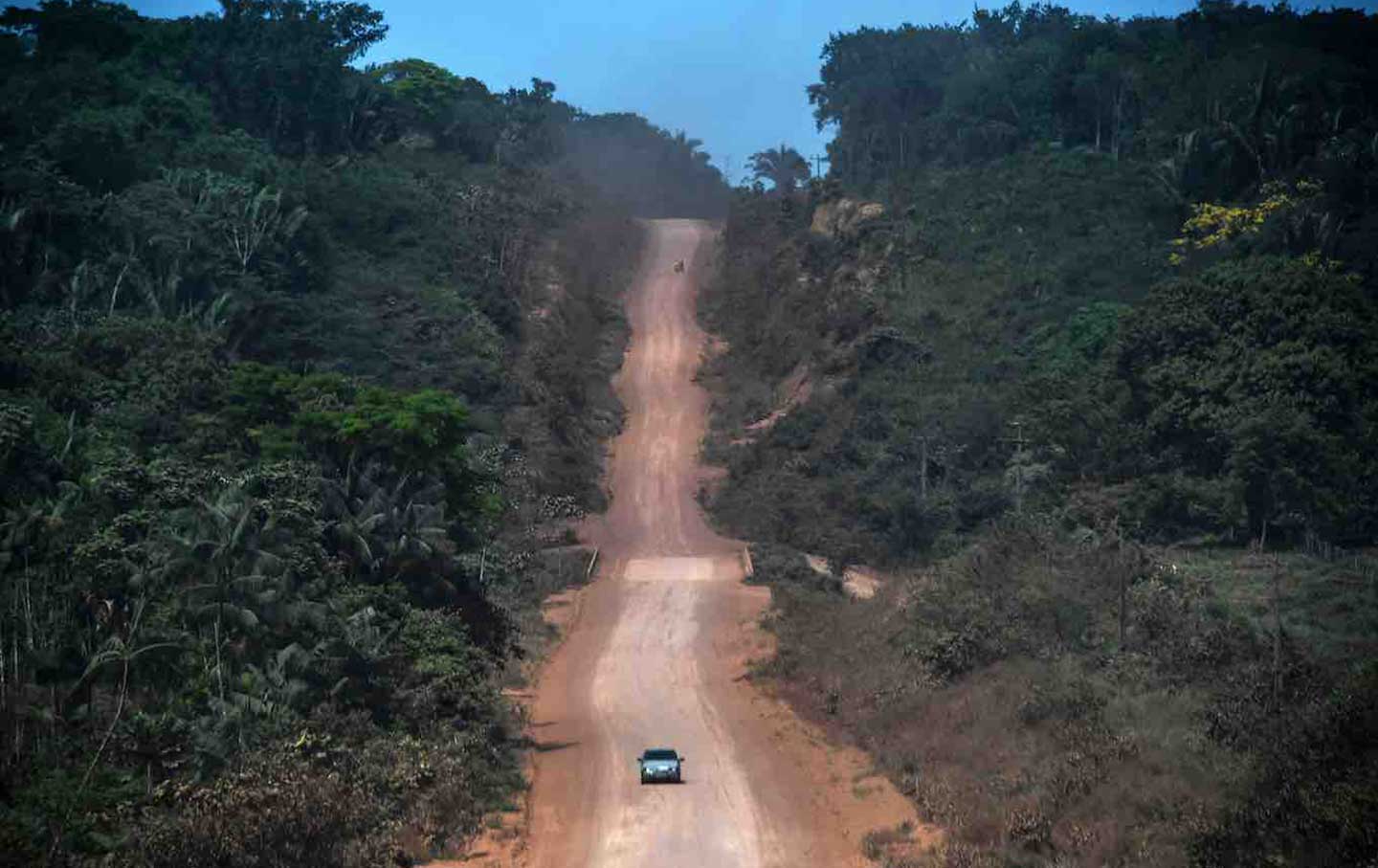/
December 14, 2024
What Comes After the Apocalypse? A Q&A With Joshua Oppenheimer
Oppenheimer’s latest film, The End, is a Golden Age, postapocalyptic musical crying out from the depths of the earth.

In the late 2000s, the filmmaker Joshua Oppenheimer trained his camera on a gang of former death-squad leaders as they sang and blustered their way through a small corner of Indonesia, recreating their most murderous exploits from the country’s genocide. The resulting documentary, The Act of Killing, exploded the boundaries of the form—and created a bone-chilling journey not merely to the heart of human darkness but through the stories we humans tell to justify atrocity.
A little more than a decade later, Oppenheimer has once again trained his camera on a gang of singing and blustering self-deceivers, but this time played by actors in a lush feature titled, simply, The End. A Golden-Age musical in modern drag, The End plunges viewers several decades into the future, and deep under the earth, to a salt mine where a ludicrously wealthy family has made their home after the climate apocalypse. Imagine No Exit but with infinitely more humanity, where the horror comes not from watching people squirm in the refracted torments of other people but from the emptiness of love curdled by willed delusion.
When the film begins, more than 20 years have passed since the family went underground, and they—and their small retinue of assistants and enablers—are the only humans remaining on the planet. They are Mother, a withholding former ballet dancer who’s been hollowed to a husk by a guilt she cannot name (Tilda Swinton); Father, an oil tycoon with a jaunty blindness to the devastation he helped wreak (Michael Shannon); and Son, a sweetly muddled young man who’s spent his whole life underground (George MacKay). When a Girl (Moses Ingram) stumbles into their fiercely ordered universe, its fragile equilibrium threatens to shatter.
Like all the most intimate family dramas, The End is also allegory—or, as legendary theater director Peter Sellars observed, “it’s about being alive right now.” Watching it, he said, reminded him of “one of those incredible film experiences—a lot of them silent movies where somebody was at the edge of the known world, trying to move forward.”
A few days before The End’s December 13 release, Sellars interviewed Oppenheimer about his newest entrant into what might be called the cinema of self-delusion. They talked about how Oppenheimer came to make the film, why it had to be a musical, and what we, the audience, can learn from it. Their conversation has been edited for length and clarity.
—Lizzy Ratner
Peter Sellars: I think this film shows years of not just work, but of searching. It is so deeply thought through, looked for, waited for—and this moves me, because we’re at a time where everybody has big things to say about the end of the world but, really, they’re just saying them off the top of their head. And now, here’s you patiently trying to say: What is it that we’re going through? What are the limits of the stories we’re telling each other? And what is it going to take to break through to other stories?
So, would you talk about the genesis of this film?
Current Issue
Joshua Oppenhimer: Well, very concretely, I wanted to make a film about the billionaires who came to power on the backs of genocide in Indonesia, after making The Act of Killing and The Look of Silence and meeting some of the oligarchs on the periphery of that shooting process. I wanted to explore not just the material histories, but also the dreams and imaginary realities of people who enriched themselves by exploiting a country that was terrified of them because they’d committed mass murder.
And yet, when The Act of Killing came out, I couldn’t return safely to Indonesia, and still haven’t been able to. So I started investigating oligarchs in analogous situations elsewhere. And there was one in Central Asia who was an oil tycoon who had commissioned acts of real political violence to gain his oil concessions, and he was seeking to extend his legacy into eternity. And part of it was through buying a bunker for his family. It was a kind of shell that still had to be finished, but it was to have many of the same facilities that you see in The End.
And I was just dying to ask, “Well, once you move in here, how would you cope with your guilt for the catastrophe from which you’d be fleeing?” He believed that the consequences of environmental collapse due to climate change would probably lead nation states to break down. You’d get warlordism. You’d get warlords taking possession of nuclear weapons. You’d therefore get regional nuclear wars, which would spiral out of control and become a global nuclear war. And that’s the kind of catastrophe that could lead him and his family to seek shelter in the bunker for the long term.
And I wanted to ask, “How would you cope with your remorse for leaving loved ones behind? How would you raise a new generation?” But these were not questions I knew him well enough to ask directly. And I thought, actually, he wouldn’t be able to answer them.
But, if I could be there and bear witness to what this family would become, what new humanity would be born in such a place 25 years after the end, I would see how their inability to talk about these things would shape their lives, hollow out their ability to love one another.
And I realized what I would really love to do is to be in this bunker 25 years after the family has moved in and film and make a documentary of that. But I wasn’t going to do that. [Laughs]
Popular
“swipe left below to view more authors”Swipe →
-
What Was the Biggest Factor in Kamala Harris’s Defeat?
What Was the Biggest Factor in Kamala Harris’s Defeat?
-
If Democrats Want to Reconnect With the Working Class, They Need to Start Listening to Unions
If Democrats Want to Reconnect With the Working Class, They Need to Start Listening to Unions
-
The Agony of Aaron Rodgers
The Agony of Aaron Rodgers
-
“Made in America” Never Meant More Ethical
“Made in America” Never Meant More Ethical
So on the way home—not knowing what I would do and having heard just before this trip that I needed to be very careful around this family because the project could be kind of physically dangerous for me and especially the crew—I watched one of my favorite films on my laptop, which was The Umbrellas of Cherbourg by Jacques Demy.
PS: Oh my God, oh my God!
JO: And I thought to myself, I know what I’ll do: I will make a musical. It’ll be set in this bunker. It’ll be 25 years after the family moves in. It’ll be an American family because this is a quintessentially American genre.
PS: So now you’ve made this incredible, like, Noel Coward play, with songs set inside a sealed tomb of the pharaohs. It’s absurd. It’s cruel. It’s comical. And it’s devastatingly accurate. Would you just talk more about the moment where you said this has to be a musical?
JO: You know, those Golden Age musicals were, in a way, this whistle-stop tour of an American empire that was at its most confident, even as we were a nation of apartheid and the potential for nuclear apocalypse, and incredible global hubris. And I always think of The End as the last stop on that tour.
And I think that it always had to be a musical. If it weren’t, it would be a kind of bleak science fiction scenario of a family struggling to survive an apocalyptic situation. That it’s a musical is what makes it a story of denial—and of what an inability to face our truth and our guilt does to our humanity.
And I think in the deepest sense, without sounding trite, the film is about love, and about how our capacity for love is diminished when we’re too afraid to be honest with ourselves and with our loved ones. And when I say loved ones, I do not only mean our immediate family members. I also mean the broader human family that we don’t normally count among our loved ones only because the retrograde, guilt-ridden fear of looking at how we treat the stranger haunts us. So we don’t embrace the broader human community. We don’t embrace the broader animal community. We don’t embrace the broader biosphere.
That sounds awfully grand and abstract, but you know, if you can’t look honestly at your role in the world, and in your family, and with other human beings, and with other life on earth, you can’t protect what you love.
So we now are in a situation where our inability to understand that we’re part of a broad human family, that we’re part of life on earth, that we are a living, breathing planet, means that everything is falling apart—not just the nation, which we see in tatters at the moment, but also life on earth, the atmosphere, the air we breathe.
PS: The film has this incredible nostalgia quality, this quality of a culture that is so rooted in the past that the act of imagining the future is too much. And so all you can do is keep re-imagining the past over and over again—which is, of course, the heart of conservatism. And to me, what you’ve done is touch that so beautifully, first of all, by your evocation of the 50s musicals—and also you’re refusing to retouch the voices. To hear people’s fragile, broken voices, just trying to lift themselves up against the specific gravity of their feeling and their real-life situation is just heartrendingly beautiful.
JO: I think early in the writing we understood that, what gets them singing is not this kind of explosion of inner truth too big for dialogue, too big for speech—which, sure, why not render that as polished and perfected as possible? Why not let that be dubbed by the perfect operatic or Broadway singing voice or pop singing voice? But what gets them singing are these crises of doubt, where all the stories that they tell themselves so that they can get up in the morning and face themselves start to unravel and fray—and they reach desperately for new melodies, new music, to kind of cobble together a life raft of song.
And in that sense, Josh Schmidt [who composed the music] and I understood that we were trying to write these luminously beautiful lies. And what propels the song is the effort of trying to spin those lies, even as they’re unraveling. You know, it’s like they’re building the bridge as it’s crumbling behind them.
PS: You know, the sheer length of the film is one of my favorite things about it because the quality of endurance is so crucial. We have to live long enough down there that we really begin to internalize it. We have to actually plunge. And the only way to plunge deep is to plunge deep enough that you can’t come up again for a long time. And that’s what I truly admire about the film—the long view, the long game. This is all about endurance.
JO: I remember a reaction from one of the very first viewers in Telluride who asked me, is the film bleak? And then he [answered], no, it’s actually hopeful and refreshing to finally see a picture of what the world feels like, at least to my generation. And this was at someone in his early 20s.
And I think there’s something about what you said that I hadn’t thought of consciously until now, but was definitely behind the instinct to shoot as many of the songs, but also some of the scenes, in single takes and with very economical coverage when we had more than one angle.
PS: Could I just invite you to just speak a little bit about some of the very specific work with the actors. Every one of these actors, you feel the depth of political commitment, which is, you feel that they have joined this film as deep believers and that they actually want to carry this message forward to the human race. You feel they’re speaking to us through these characters in some Blakean way.
JO: Everyone who joined the ensemble came on board, not simply because they liked the script and found the role and the challenge interesting, but because they felt this was the moment to create this wake up call from the depths of this salt mine where we would film the movie. And I remember Michael Shannon, when he read the script, he said: “Oh, of course I’m going to do this. This is one of the most important things I could sign up to do. It just means that much to me.”
Everyone in the ensemble had this ethical urgency compelling them to participate—while [at the same time] being artists who would never judge the humanity of those they were depicting. And that creates this embodied intimacy and commitment and vulnerability that I do think surpassed what I was hoping for. And, you know, they all worked in such different ways.
Tilda and I were committed to really honing in on that vulnerability. She had this word that she came to me with early on—it’s almost like the opposite of a safe word. It was a risk word. It was shell-less: “Whenever we whisper to one another shell-less, let’s have a pact that we intend to go deep.”
PS: The beauty and depth of the slow pacing—this feels like an epic is being recounted. You know, one of the late chapters of the Bhagavad Gita is so profound—it’s about monsters who are destroying the planet, these selfish people whose selfishness has led the entire civilization to a point of doom and collapse. And, in the Bhagavad Gita, it says you can’t point your fingers at those people. You have to approach them with a level of compassion that enables them to feel again for the first time. And that’s so much what I feel you’ve done: You’ve surrounded these bereft people with compassion; you’re regarding them with such kindness and patience and willingness to say, ‘I’m with you, I’m going to be with you in your worst moment—and at the same time, I’m going to wait for you to take that moment to a place of understanding and honesty and responsibility. And repentance. And then, can you find what a next step could be?’
JO: I think the tragedy of the film is that they realize that they need to feel, and they are brought to the place that they can feel again, and they need to move forward, and they need to change. And then for reasons that I hope are clear, because we share them, they can’t—but they can’t so that we can. That’s the logic of tragedy, right? The characters make mistakes so that we don’t have to. And the whole effort from the cast and from me and from everyone else who made it is to say that we still can [change].
Like any cautionary tale, the film’s creation is an act of hope—because you only tell a cautionary tale if you believe there’s still time for people to heed the warning, that it’s not too late for us: We will leave the cinema and we will step outside, and we will look up and there will be the sky. Unlike for the family, there will be the sky.
Peter Sellars
More from The Nation
The Peculiar Case of Ignatius Donnelly
The Peculiar Case of Ignatius Donnelly
The Minnesota politician presents a riddle for historians. He was a beloved populist but also a crackpot conspiracist. Were his politics tainted by his strange beliefs?
The Agony of Aaron Rodgers
The Agony of Aaron Rodgers
Is he the world’s most interesting athlete or is he just a washed-up crackpot?
Can You Understand Ireland Through One Family’s Terrible Secret?
Can You Understand Ireland Through One Family’s Terrible Secret?
In Missing Persons, Clair Wills’s intimate story of institutionalized Irish women and children, shows how a family’s history and a nation’s history run in parallel.
Books & the Arts
/
Emily McBride
Peter Schjeldahl’s Pleasure Principle
Peter Schjeldahl’s Pleasure Principle
His art criticism fixated on the narcissism of the entire enterprise. But over six decades, his work proved that a critic could be an artist too.
How the Western Literary Canon Made the World Worse
How the Western Literary Canon Made the World Worse
A talk with Dionne Brand about her recent book, Salvage, which looks at how the classic texts of Anglo-American fiction helped abet the crimes of capitalism, colonialism, and more…
Along the Roads That Built Modern Brazil
Along the Roads That Built Modern Brazil
José Henrique Bortoluci’s What Is Mine tells the story of his country’s laborers, like his father, who built its infrastructure, and in turn its fractious politics.






